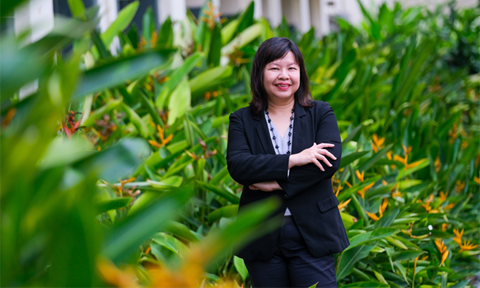Returning to school to become a better educator and leader
Ms Shabana Begum Mohamed Ayoob knows better than most how learning can lead to transformative growth.
After completing a diploma in fashion design and an undergraduate degree in communication, she found inspiration in art’s ability to engage and empower people from various walks of life. This motivated her to pursue a career as an art educator.
As a teacher, she found herself drawn to exploring innovative teaching methods, integrating technology into art education and adapting the curriculum to better meet the evolving needs of students. With every passing year, she became even more passionate about honing her craft as an educator and using art to make a positive impact on her students’ lives.
Her intellectual curiosity and desire to grow in her career led her to enrol in the part-time Master of Education (Art) programme at the National Institute of Education, Nanyang Technological University, Singapore (NIE NTU, Singapore) in 2022.
“I wanted to deepen my understanding of pedagogical theories, research methodologies and best practices in art education,” explained Ms Shabana, who graduated from NIE at the end of last year. “Moreover, I aspired to take on leadership roles within the educational community and contribute to shaping the future of art education.”
ENRICHING HER PROFESSIONAL LEARNING AND DEVELOPMENT
An institution committed to meeting the learning needs of working professionals, NIE’s over 30 graduate programmes are curated to support the continual development of educators and professionals employed in related industries and sectors.
Ms Shabana chose NIE for its strong academic reputation, experienced lecturers as well as ample resources and facilities for art education, which include art studios, galleries and specialised rooms for learning. The curriculum for the Master of Education (Art) also aligned with her research interests and goals.
As an adult learner with two sons aged 8 and 13 years old, Ms Shabana wished to inspire her children to strive in the face of challenges to achieve their goals. Thankfully, the process of re-integrating into an academic space as a student was made easier by the welcoming and inclusive community at NIE, she recalled.
“The lecturers fostered a sense of belonging and provided platforms for active participation in class as well as opportunities for collaboration, which enhanced the learning experience.”
She noted that NIE’s supportive learning environment encouraged students to explore interdisciplinary connections between art and other subjects, nurturing their creativity and critical thinking.
“The programme incorporates elements of visual arts, art history, pedagogy, psychology and cultural studies. This holistic approach allowed us to develop a well-rounded understanding of art education theory and practice,” she shared.
Ms Shabana also appreciated the inclusion of global perspectives into the programme, which exposed students to diverse cultural practices, artistic traditions and educational philosophies. This was enriched by classmates hailing from a wide range of countries, who contributed their unique cultural insights to classroom discussions.
In addition, the programme addressed the impact of technology on both education and the arts. There was a deliberate focus on integrating technology into art education practices, allowing students to delve into digital art-making tools, online learning platforms and multimedia approaches to teaching.
This was complemented by a rigorous approach to traditional academic research – students were trained to engage in scholarly inquiry and contribute to art education’s knowledge base by conducting empirical studies and writing dissertations.
Learning wasn’t limited to the classroom. Ms Shabana recounted numerous opportunities for hands-on and practical experiences in art education settings, like teaching practicums, internships in schools and community outreach projects that offered her and her peers the chance to apply their learning to real-world contexts.
There were also opportunities for professional development and networking, such as workshops, seminars and collaborations with practising artists and educators, ensuring that students were up to date on trends and best practices in art education.
ADVOCATING FOR PROGRESS
Post-graduation, Ms Shabana seeks to enhance the delivery and impact of art education at her workplace by applying her knowledge of effective teaching strategies, curriculum design and student engagement. For example, she encourages upper secondary students to think out of the box and take creative risks by using artificial intelligence (AI).
“Students are not afraid to make mistakes, as the technology enables them to rectify their mistakes instantly,” she explained. “With AI, students extend their learning beyond the classroom, broadening their perspectives and preparing for contemporary careers in digital arts and design. This integration makes art education more relevant and engaging.”
In addition, Ms Shabana uses a pedagogical method called the gallery walk – where student teams rotate between different stations in the classroom, leaving notes on discussion topics and commenting on other teams’ notes. This method enhances students’ abilities to analyse, interpret and critique both their own work and that of their peers.
By learning to express themselves, students hone their cognitive and emotional development, and can apply these skills to other academic areas and real-life situations, she noted.
“The Master of Education (Art) programme at NIE has provided me with invaluable insights and the skills to excel,” said Ms Shabana. “Apart from the high-quality education programmes, innovative teaching methods, supportive learning environment and dedicated faculty members who are experts in their fields, the best part has been the opportunities for professional development and personal growth. I recommend the programme to those seeking to make a difference in the world of art education.”
Learn more about graduate programmes at NIE NTU, Singapore. Applications are ongoing until Jul 4, 2024, for coursework, Doctor in Education, and Jul 25, 2024, for research programmes.
Read the original article here.
Source: Channel NewsAsia © Mediacorp Pte Ltd. All rights reserved.


).tmb-listing.jpg?Culture=en&sfvrsn=ef5c8215_1)
.tmb-listing.jpg?Culture=en&sfvrsn=81ad6f32_1)



